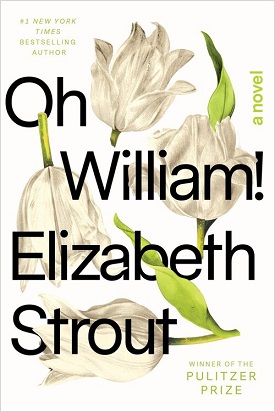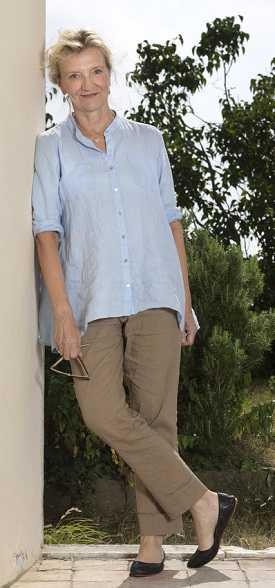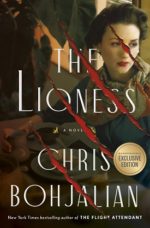 Synopsis:
Synopsis:
I would like to say a few things about my first husband, William.
Lucy Barton is a writer, but her ex-husband, William, remains a hard man to read. “William,” she confesses, “has always been a mystery to me.” Another mystery is why the two have remained connected after all these years. They just are.
So Lucy is both surprised and not surprised when William asks her to join him on a trip to investigate a recently uncovered family secret — one of those secrets that rearrange everything we think we know about the people closest to us. What happens next is another example of what has been called author Elizabeth Strout’s “perfect attunement to the human condition.” There are fears and insecurities, simple joys and acts of tenderness, and revelations about affairs and other spouses, parents and their children.
On every page of Oh William! readers learn more about the quiet forces that hold us together . . . even after we’ve grown apart. And at the heart of the story is the indomitable voice of Lucy Barton providing a profound, lasting reflection on the very nature of existence.
“This is the way of life: the many things we do not know until it is too late,” Lucy observes.
Review:

Elizabeth Strout is the #1 New York Times bestselling and Pulitzer Prize-winning author of eight novels. She introduced Lucy Barton in My Name is Lucy Barton and Lucy appeared again in Anything Is Possible. The story in Oh William! is related in Lucy’s distinctive voice. The narrative is at times disjointed, repetitive, stuttering, and awkward. It is also honest, raw, and deeply relatable. Strout says, “Lucy’s voice is one that seems to come naturally to me. I am not Lucy, but she is accessible to me in a strange way. Her voice is who she is, and she has what I think of as a kind of breathy, almost anxious, way of speaking. She was born in poverty and I was not. But there was an isolation to her background that I can identify with.”
The book is an exploration of Lucy’s relationship with her first husband, William Gerhardt, a seventy-one-year-old scientist (parasitologist) and professor who still goes to the laboratory every day but is keenly conscious of the fact that his younger colleagues are bypassing him. In the years after Lucy learned of his philandering and left him, William remarried twice and, as the story opens, is living with his much younger third wife, Estelle, with whom he has a daughter, Bridget. William did not want more children, but he loves Bridget deeply, as he does his two older daughters with Lucy, both of whom are married. Lucy is now sixty-four years old and a published author. Her second husband, David, died recently and she is grieving. Early in the book, Lucy admits that William, her husband for twenty years, “has always been a mystery to me — and to our girls as well.” But she also reveals that “William is the only person I ever felt safe with. He is the only home I ever had” even though there were times during the marriage that she “loathed him.”
Strout says inspiration for Oh William! struck when she attended a rehearsal of a one-woman show, My Name is Lucy Barton, starring esteemed actress Laura Linney as Lucy. The director mentioned William and Linney quietly murmured something to the effect of “Maybe William had an affair.” Strout says, “I suddenly thought: Oh William!” She instantly knew that William would have his own story, the foundation of which had been established in her prior novels. William is the son of a German prisoner of war who, during World War II, was transported to one of four camps in remote areas of Maine to work in the potato fields. There, he met and fell in love with William’s mother, Catherine, who was, at the time, married to a potato farmer.
As Oh Wiliam! opens, William and Lucy meet occasionally in a diner for coffee. Two years ago, during one such meeting, he told her he had been experiencing night terrors. One involved his late mother, Catherine, who seemed to be with him, hovering. Some time later, Estelle gifted him a subscription to an online ancestry site. It revealed that Catherine had another child two years before William was born, fathered by her first husband, the potato farmer. William had no idea he had an older sister, Lois, and has been unable to locate a death certificate for her. Rather, he discovers that she married in 1969, and had children and grandchildren. At first, he refuses to believe it because he cannot understand why he was never told about Lois as a child. Where was she while he was growing up? And more importantly, did his mother abandon her own child? How could she do such a thing?
A few months later, William asks Lucy to come to his apartment right away. Worried about him, she agrees. When she arrives, she learns that William returned from a conference in San Francisco to find a hand-written note from Estelle announcing that she has moved out. She informs William that he is “kind of unreachable a lot. But you’re a good man. You just seem faraway at times. I mean a lot of times.” Lucy spends the afternoon with William and they go out to dinner, over which William acknowledges that he does have an older sister. And she must have been about a year old when his mother abandoned her. A week later, William asks Lucy to accompany him to Maine for a few days. He explains he has located Lois’s address and wants to just “go look.” Lucy, still mourning David and lonely, agrees because she also still cares deeply for William and wants to help him find answers about his family, especially Catherine, with whom Lucy had a complex, but loving relationship.
Lucy shares her innermost thoughts and feelings about her life and relationships. Events and mentions of various other characters stir up her memories, and she details how she and William met, fell in love, and what being married to him was like. She reveals the isolation she has always felt, in part due to her atypical childhood. She explains that she feels invisible in the world “in the deepest way,” even though she knows that she truly isn’t, in no small measure because she is a mother — and she adores her daughters. Even as a successful author, she feels the weight of her own childhood bearing down upon her at times.
The road to Maine turns out to be paved with little epiphanies. Their fondness for each other is evident (they still refer to each other by the nicknames they used when married — she is “Button” and he is “Pillie”), but they also still get on each other’s nerves. He wears khaki pants that are far too short and she resents his insensitivity to her needs, while he gripes that she seems to always be hungry but never eats anything. The trip reminds her “what a hideous thing marriage was for me at times those years with William . . . Intimacy became a ghastly thing.” She recalls the ways in which William, a man who has always remained emotionally detached and unavailable to the women with whom he has been involved, betrayed her during their marriage and how she responded to his duplicitous behavior, as well as the times that William acted like a spoiled and petulant child.
With Lucy at his side, William confronts the truth about his family — his father was a member of the Hitler Youth and his mother was not who she wanted the world to think she was. In fact, it was his father’s background that caused Lucy’s family to reject William and refuse to attend their wedding. She examines why she “felt a little bit like things were not entirely real,” beginning on the day she married William at the country club to which his mother belonged, and how the feeling persisted during the entirety of the marriage. They navigate to Catherine’s childhood home, a place William has never before seen, and what they find provides new context to Catherine’s habits and actions. They also find their way to the address William found for Lois, the former Miss Potato Blossom Queen. Indeed, she still lives in the cozy home, having been widowed five years ago. Will the siblings enjoy a happy meeting?
Oh William! is a meditation on marriage, family, and connectedness. Strout’s seemingly effortless storytelling brings Lucy and William vividly to life and invests readers in their well-being. Because Lucy and William have two daughters, their lives are always going to be, to some extent, intertwined. The story is an argument for the proposition that love and affection linger long after intimate relationships end. Their daughters are puzzled by their parents’ road trip, and one of them even asks if Lucy and William are going to get back together, but Lucy assures her that will not happen. Still, years after their divorce and marriages to other partners, Lucy’s feelings about William remain conflicted and multi-layered. Through Lucy, Strout contemplates whether it is possible to ever really know another person and, if not, whether that really matters, in the long run. Is it perhaps possible to form an unbreakable connection with someone that will withstand myriad little aggravations, large betrayals, and divorce? Do forgiveness and acceptance of the fact that “we are all mythologies, mysterious” bring peace, and permit us to escape that feeling of “unreality” that Lucy experienced for so many years? Stout’s unembellished consideration of those questions is engaging, poignant, and emotionally resonant.
Excerpt from Oh William!
I would like to say a few things about my first husband, William.
William has lately been through some very sad events—many of us have — but I would like to mention them, it feels almost a compulsion; he is seventy-one years old now.
My second husband, David, died last year, and in my grief for him I have felt grief for William as well. Grief is such a — oh, it is such a solitary thing; this is the terror of it, I think. It is like sliding down the outside of a really long glass building while nobody sees you.
But it is William I want to speak of here.
His name is William Gerhardt, and when we married I took his last name, even though at the time it was not fashionable to do so. My college roommate said, “Lucy, you’re taking his name? I thought you were a feminist.” And I told her that I did not care about being a feminist; I told her I did not want to be me anymore. At that time I felt that I was tired of being me, I had spent my whole life not wanting to be me—this is what I thought then—and so I took his name and became Lucy Gerhardt for eleven years, but it did not ever feel right to me, and almost immediately after William’s mother died I went to the motor vehicle place to get my own name back on my driver’s license, even though it was more difficult than I had thought it would be; I had to go back and bring in some court documents; but I did.
I became Lucy Barton again.
We were married for almost twenty years before I left him and we have two daughters, and we have been friendly for a long time now—how, I am not sure exactly. There are many terrible stories of divorce, but except for the separation itself ours is not one of them. Sometimes I thought I would die from the pain of our separating, and the pain it caused my girls, but I did not die, and I am here, and so is William.
Because I am a novelist, I have to write this almost like a novel, but it is true—as true as I can make it. And I want to say — oh, it is difficult to know what to say! But when I report something about William it is because he told it to me or because I saw it with my own eyes.
So I will start this story when William was sixty-nine years old, which is less than two years ago now.
A visual:
Recently William’s lab assistant had taken to calling William “Einstein,” and William seemed to get a real kick out of that. I do not think William looks like Einstein at all, but I take the young woman’s point. William has a very full mustache with gray in its whiteness, but it is sort of a trimmed mustache and his hair is full and white. It is cut, but it does stick out from his head. He is a tall man, and he dresses very well. And he does not have that vaguely crazy look that Einstein, to my mind, seemed to have. William’s face is often closed with an unyielding pleasantness, except for once in a very great while when he throws his head back in real laughter; I have not seen him do that for a long time. His eyes are brown and they have stayed large; not everyone’s eyes stay large as they get older, but William’s eyes have.
Now —
Every morning William would rise in his spacious apartment on Riverside Drive. Picture him—throwing aside the fluffy quilt with its dark blue cotton cover, his wife still asleep in their king-size bed, and going into the bathroom. He would, every morning, be stiff. But he had exercises and he did them, going out into the living room, lying on his back on the large black-and-red rug with the antique chandelier above him, pedaling his legs in the air as though on a bicycle, then stretching them this way and that. Then he’d move to the large maroon chair by the window that looked out over the Hudson River, and he would read the news on his laptop there. At some point Estelle would emerge from the bedroom and wave to him sleepily and then she would wake their daughter, Bridget, who was ten, and after William took his shower the three of them had breakfast in the kitchen at the round table; William enjoyed the routine of this, and his daughter was a chatty girl, which he liked as well; it was as though listening to a bird, he once said, and her mother was chatty also.
After he left the apartment he walked across Central Park and then took the subway downtown, where he got off at Fourteenth Street and walked the remaining distance to New York University; he enjoyed this daily walking even though he noticed that he was not as fast as the young people who bumped past him with their bags of food, or their strollers with two kids, or their spandex tights and earbuds in their ears, their yoga mats on a piece of elastic slung over their shoulders. He took heart in the fact that he could pass many people—the old man with a walker, or a woman who used a cane, or even just a person his age who seemed to move more slowly than he did—and this made him feel healthy and alive and almost invulnerable in a world of constant traffic. He was proud that he walked more than ten thousand steps a day.
William felt (almost) invulnerable, is what I am saying here.
Some days on these morning walks he would think, Oh God I could be that man—! over there in the wheelchair sitting in the morning sun in Central Park, an aide on a bench typing on her cellphone as the man’s head dropped forward to his chest, or he could be that one—! with an arm twisted from a stroke, a gait uneven— But then William would think: No, I am not those people.
And he was not those people. He was, as I have said, a tall man, to whom age had not added extra weight (except for a small potbelly you could barely see with his clothes on), a man who still had his hair, white now but full, and he was—William. And he had a wife, his third, twenty-two years younger than he was. And that was no small thing.
But at night, he often had terrors.
William told me this one morning — not quite two years ago — when we met for coffee on the Upper East Side. We met at a diner on the corner of Ninety-first Street and Lexington Avenue; William has a lot of money and he gives a lot of it away and one place he gives it to is a hospital for adolescent children near where I live, and in the past when he had an early-morning meeting there he would call me and we would meet briefly for coffee on this corner. On this day — it was March, a few months before William was to turn seventy — we sat at a table in the corner of this diner; on the windows were painted shamrocks for St. Patrick’s Day, and I thought — I did think this — that William looked more tired than usual. I have often thought that William gets better-looking with age. The full white hair gives him an air of distinction; he wears it a little bit longer than he used to and it rises slightly from his head, with his big drooping mustache to counter it, and his cheekbones have emerged more, his eyes are still dark; and it is a tiny bit odd, because he will watch you fully — pleasantly — but then every so often his eyes become briefly penetrating. So what is he penetrating with that look? I have never known.
That day in the diner, when I asked him “So how are you, William?,” I expected him to answer as he always does, which is to say in an ironical tone “Why, I am perfectly fine, thank you, Lucy,” but this morning he just said “I’m okay.” He was wearing a long black overcoat, which he removed and folded over the chair next to him before sitting down. His suit was tailor-made, since meeting Estelle he had been having his suits tailor-made, and so it fit his shoulders perfectly; it was dark gray and his shirt was pale blue and his tie was red; he looked solemn. He folded his arms across his chest, which is what he often does. “You’re looking nice,” I said, and he said, “Thanks.” (I think William has never told me that I am looking good, or pretty, or even well, in all the times we have seen each other over the years, and the truth is that I have always hoped he will.) He ordered our coffee and his eyes flitted about the place while he tugged lightly on his mustache. He spoke about our girls for a while—he was afraid that Becka, the younger, was mad at him; she had been sort of—vaguely—unpleasant to him on the phone when he had simply called to chat with her one day, and I told him that he just had to give her space, she was settling herself into her marriage—we spoke like that for a bit—and then William looked at me and said, “Button, I want to tell you something.” He leaned forward briefly. “I’ve been having these awful terrors in the middle of the night.”
When he uses my pet name from our past it means that he is present in some way he is so often not, and I am always touched when he calls me that.
I said, “You mean nightmares?”
He cocked his head as though considering this and said, “No. I wake up. It’s in the dark when things come to me.” He added, “I’ve never had this sort of thing before. But they’re terrifying, Lucy. They terrify me.”
William leaned forward again and set his coffee cup down.
I watched him, and then I asked, “Is there some kind of different medication that you’re taking?”
He scowled slightly and said, “No.”
So I said, “Well, try taking a sleeping pill.”




1 Comment
Thank you for the detailed review on a very interesting story.